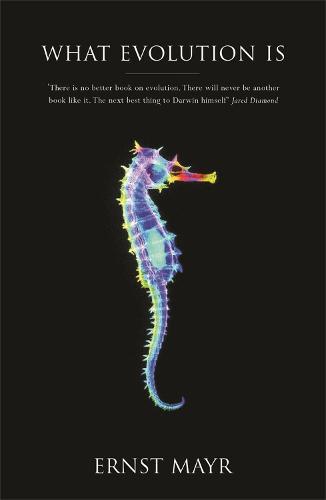Full Product Details
Author: Ernst Mayr
Publisher: Orion Publishing Co
Imprint: Weidenfeld & Nicolson
Dimensions:
Width: 13.20cm
, Height: 2.70cm
, Length: 19.70cm
Weight: 0.332kg
ISBN: 9780753813683
ISBN 10: 0753813688
Pages: 368
Publication Date: 05 December 2002
Audience:
General/trade
,
General
Format: Paperback
Publisher's Status: Active
Availability: To order

Stock availability from the supplier is unknown. We will order it for you and ship this item to you once it is received by us.
Reviews
Mayr is one of the influential scientists of the last century. This compact book delivers the wealth of his 70 year career in a single, well measured punch. GLASGOW HERALD We are taken all the way from Darwin to the frontiers of biology, including ideas on the causes of altruism and the consequences for humans now that natural selection is no longer happening to us. OBSERVER
In his foreword, Mayr describes his book as an 'elementary volume' aimed at those wanting to know more about evolution. Acknowledging that there are now many books on the market that purport to explain evolution, he argues that generally they are not didactic enough and fail to present a 'concise, reader-friendly account'. This all raises the reader's hopes that this book is going to be a definitive and accessible guide to evolution. Unfortunately, it is not to be. Mayr, a very distinguished figure in the field of evolutionary theory and a Professor Emeritus at Harvard University, has produced a text that is very hard work for the non-specialist. Readers used to the crystal-clear prose of popularisers like Richard Dawkins and Steve Jones will struggle with Mayr's dense explanations of evolution. The main difficulty is that he has little grasp of what the layman might reasonably be expected to know, so he leaves out some fairly essential information. For example, although he refers several times to 'Mendelian genetics', nowhere does he tell us who Mendel was, or explain why his discoveries were so important to evolutionary theory. He also has a tendency to use technical terms without explanation; a typical Mayr sentence goes: 'An even higher taxonomic level is involved in so-called clade selection, a clade being a holophyletic group of taxa forming a branch of a phylogenetic tree.' Another problem with the book is that Mayr tends to smooth over some over the major debates among evolutionists. He dismisses, with very little discussion, Stephen Jay Gould's theory of 'punctuated equilibrium', and Richard Dawkins's view that natural selection takes place at the level of the gene rather than the individual. The reader with little previous knowledge of evolutionary ideas would get the impression that most of the big arguments have long been resolved and settled, which is certainly not the case. Having said all that, this is still a very thorough and detailed account both of Darwin's theory of evolution and the evidence that exists to support it. Readers who are prepared to persevere through the difficult early chapters will find everything they need to know about how evolution works, in theory and in practice. The later chapters (especially the one on the evolution of humans) are particularly interesting, and an easier read than the early ones. Nonetheless, a word of warning: if you don't know anything about evolutionary theory, this isn't the place to start. (Kirkus UK)
Author Information
Ernst Mayr was born in Germany in 1904. He was one of the main architects of the modern synthesis of genetic and evolutionary theory and his career has spanned fields as diverse as ornithology, systematics, zoo-geography, evolutionary theory and the history and philosophy of science. He has written 13 books and published more than 700 scientific papers.




